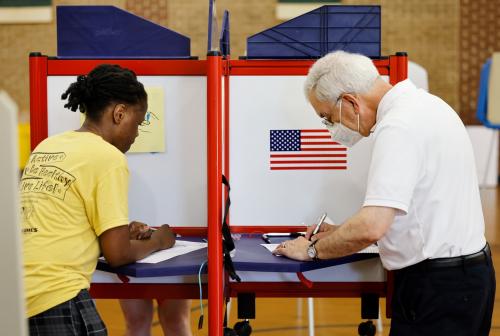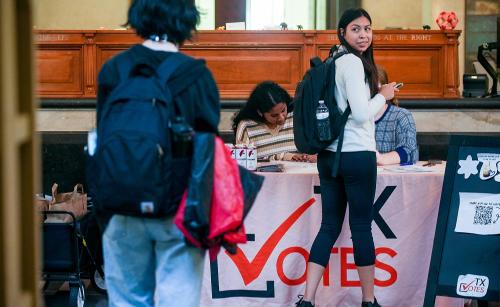

12:30 pm EDT - 2:00 pm EDT
Past Event
12:30 pm - 2:00 pm EDT
1775 Massachusetts Avenue, N.W.
Washington, DC
20036
On September 30, 2010, the Saban Center for Middle East Policy at Brookings hosted a policy luncheon discussion with Shadi Hamid, Saban Center Fellow and Director of Research at the Brookings Doha Center, and Michele Dunne, Senior Associate at the Carnegie Endowment for International Peace and Editor of the Arab Reform Bulletin. The two speakers discussed the issue of presidential succession in Egypt and the implications of a post-Hosni Mubarak era on Egypt, the Middle East, and U.S. policy in the region. The event was moderated by Bruce Riedel, Senior Fellow at the Saban Center.
Shadi Hamid presented an overview of the internal situation in Egypt, including an analysis of the current mobilization efforts of opposition leaders and movements. Hamid framed his discussion by asking whether Egypt can transition from its current authoritarian political system to a more democratic one, and whether the current situation lends itself to that transition. He pointed out that both U.S. policymakers and Egyptian opposition leaders have been unable to affect a more democratic future for Egypt, mainly due to the deep-seated skepticism of change in Arab authoritarian regimes. In fact, there has been talk of democratic transition since the 1980s, when Egypt was actually more democratic than it is now. Nonetheless, the regime has become more repressive since, and therefore scholars, policymakers, and opposition leaders are still—decades later—discussing the prospects of democratic change in Egypt.
Hamid then described the extent to which the Egyptian opposition is mobilized and unified. Hamid, having traveled to Egypt twice within the past several months, noted a shift in the organization and attitude of the opposition. Whereas previously the opposition had been in disarray, now the opposition spoke about nonviolent civil disobedience, wide-scale mobilization, and the prospect of a transitional or national unity government. Hamid pointed out that the most interesting development in the opposition movement has been the recent partnership between Mohamed ElBaradei, the secular leader of the National Association for Change (NAC), and the Muslim Brotherhood. This partnership has been mutually beneficial, with ElBaradei providing international legitimacy and the Brotherhood providing domestic legitimacy and broad-based local support. Because of the number of signatures the NAC and the Muslim Brotherhood have been able to collect for ElBaradei’s petition (which calls for a series of reforms), Hamid said there is a possibility of significant pressure building on the government. Specifically, Hamid posited a scenario in which tens of thousands of protestors could coalesce and call for government reforms that include fewer restrictions for candidates to run for the presidency. There could even be a contestation of election results, similar to what occurred in Iran in 2009. Hamid emphasized that, although unlikely, these scenarios are within the realm of possibility and are being discussed among opposition leaders.
Hamid concluded by saying that international support is a critical component in the success of mass-mobilization efforts, but international support of the opposition in Egypt has been lacking. At the same time, the Egyptian opposition is skeptical of Western, especially American, influence and many Islamists in the country say that Egypt would be more democratic if it were not for the “American veto.” Hamid argued that the United States cannot have it both ways: it cannot say it supports democracy and grassroots mobilization while wanting to exclude the Muslim Brotherhood, the only real mass movement in Egypt. This dilemma, along with the fact that Arab autocracies have proven more stable than originally thought, makes the issue of democratic reform in Egypt challenging.
Michele Dunne began by saying that although Egypt is in a state of transition, this transition will not necessarily be a democratic one, noting that the most likely successor to Hosni Mubarak will come from the ruling National Democratic Party (NDP). Regarding the opposition, Dunne pointed out that its enthusiasm and mobilization efforts have been continually in flux—usually high before elections and low afterwards. With parliamentary elections scheduled for November 2010, the opposition is currently in an active stage, with high levels of mobilization and low apathy. This does not necessarily mean the opposition can take over, but it does mean the opposition can demand changes—such as opening up of political space, enhancement of the rule of law, and improvement of human rights. Regardless of whether the new president addresses these demands, the U.S.-Egyptian relationship will continue to focus on two core objectives—cooperating on military affairs, terrorism, access issues, and regional diplomacy; and maintaining a stable Egypt in the region. Dunne stated that there is a very low possibility that Mubarak’s successor will not cooperate with the United States and dispelled the idea that Egypt cooperates with the U.S. merely to serve American or Israeli interests; in fact, Egypt’s cooperation is based on its own national security interests.
Dunne stated that it is more difficult to predict the level of stability in Egypt over the coming years, which may in some part depend on the strength of the opposition (although it is unlikely the opposition will be strong enough to make a challenge for the presidency). In order to maintain a stable Egypt, Dunne emphasized that the United States must tread cautiously, careful not to be perceived as the enemy of the Egyptian government, military, or people. Nonetheless, it is in the interest of the United States to shape the political environment, encourage systemic changes, and support a reform agenda in Egypt. Examples of these political reforms include reinstituting presidential term limits, curbing the powers of the security apparatus, allowing freer formation of political parties, and permitting freer operation of civil society. The United States should support these reforms rather than be seen as bolstering a regime that restricts them. In any case, Dunne said, the United States has to realize that succession and the issues that surround it must be addressed now and that the United States cannot simply react to future events as they happen.
The audience asked the speakers a number of questions, including ones pertaining to the Egyptian Army’s role in the succession, the effects of succession on regional alliances, the likelihood of Gamal Mubarak succeeding his father, and the lack of American policy directed at democracy promotion in the last few years. Regarding the Army’s role, Hamid said that the military is not usually seen as interfering in political affairs, but that the opposition must address the fears of the elites and the military. This would best be done by setting up an electoral system that ensures Islamists would not take over the government. On the point of reforms, Dunne said that political reforms should encourage long-term stability based on modest political changes and therefore should not affect regional alliances, including with Israel. Dunne noted that Egypt’s struggles are mostly internal, pertaining to its economic problems and the government’s poor performance.
Regarding Gamal Mubarak, Dunne averred that Hosni may see designating his son successor as improper, but that amendments made to the Constitution in the past few years have paved the way for Gamal to be the NDP candidate for president. Responding to a similar question, Hamid said that over the last year, Gamal has dropped from being the presumptive successor to his father, in part due to the internal splits within the NDP. Answering a question about American policy toward democracy promotion, Dunne stated that the Obama administration spent its first year focusing primarily on government-to-government relations and largely ignored Egyptian civil society. Dunne mentioned some developments indicating that in the last six months to a year, the Obama administration has begun paying more attention to civil society and the state’s crackdown of it. Hamid added that many young Egyptians are employing Eastern European-style methods of protestation, but noted a significant difference between democracy promotion in the Eastern European and Egyptian contexts: governments, foundations, and private donors, unlike their direct support for the opposition in Eastern Europe, are less willing to directly fund the opposition in Egypt.


Elaine Kamarck, Jordan Muchnick
May 10, 2024

Elaine Kamarck, Deirdre Keenan
May 9, 2024

Gabriel R. Sanchez, Jordin Tafoya
May 8, 2024